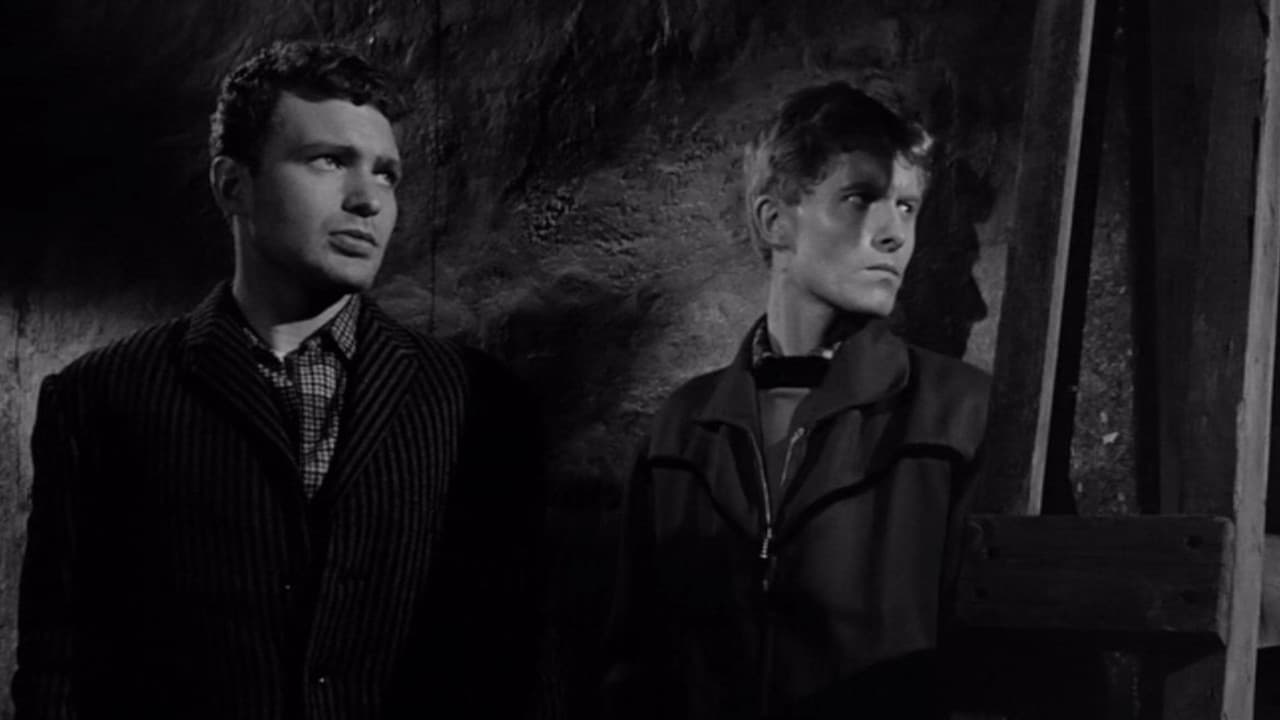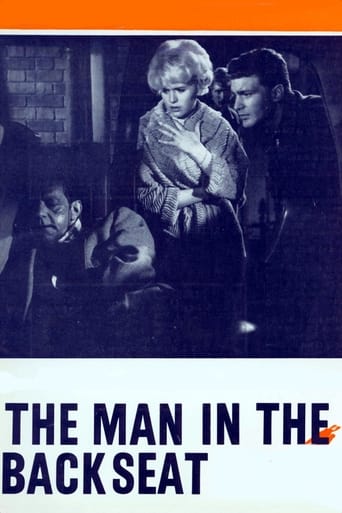

I gave it a 7.5 out of 10
... View MoreIf you like to be scared, if you like to laugh, and if you like to learn a thing or two at the movies, this absolutely cannot be missed.
... View MoreI think this is a new genre that they're all sort of working their way through it and haven't got all the kinks worked out yet but it's a genre that works for me.
... View MoreIt's a good bad... and worth a popcorn matinée. While it's easy to lament what could have been...
... View MoreThis kind of films must take care to the details. If the details are silly, then the film is silly, period. In this case, it's about a wrist connected by a chain to a bag full of money. The simplest plier could cut the bag free or open the ridiculous lock of the bag but the thieves attack the chain instead, as far as I could see in my fast forward viewing. Had they only used a steel box instead, they would have fixed the annoying detail - but they did not. Simply ridiculous. I guess they didn't care. The whole viewing of the film will thus be spent on being annoyed at a detail that did not have to be. Well, to tell the truth, this film did not need to be either.
... View MoreThis is a British film noir which is truly a classic.It contains all the classic elements of the genre.Once poor old Harry Locke it is battered unconscious there is no going back.Matters just spiral out of control with no way out.Nesbitt plays a convincing liar till he gets what he wants.By then poor old Locke is dead and the noose awaits,these were the days when hanging was still the punishment for murder.The fact that this film only runs 54 minutes makes it all the more worthwhile that such a tight narrative is fitted into such a short period of time.Furthermore there are some nice sub Hitchcockian touches when it comes to dealing with both the living and dead Harry Locke.By the way Derren Nesbitt is still going strong and is one of the funniest speakers on the celebrity circuit.
... View More... and believe me I'm not trying to trivialize what the two main characters did. This short little British noir is powered by very good acting by a trio of British players with whom I am not familiar combined with great atmosphere. Two young guys who want a short cut to the good life and aren't getting anywhere by betting on the dogs at the track decide to rob a bookie. They reason he'll be an easy target since what he does is illegal anyways and he won't report the crime to the police. From the time we meet the two robbers you know exactly where they are coming from. Frank is the weak-willed guy who goes along with whatever his more dominant and nefarious friend Tony wants, because "we're mates". Frank has a conscience and probably would have never gone down this road if not for Tony. Tony is bad news, is really nobody's mate, but knows how to manipulate Frank to help him get what he wants.The basic plot is the robbery goes bad from the start with the bookie handcuffed to his briefcase full of money, with the key to the handcuff forgotten on the bookie's desk as he leaves his office at the track. The pair of thieves are thus forced to take the unconscious bookie along with them as they have to steal the bookie's car too while they figure out how to extricate the bag from the bookie, and with them having to hit the bookie a second time when he comes to in the car. The bookie is seriously injured by this second blow, and now these two rather incompetent thugs have to balance not getting caught (Tony's top priority) with getting the bookie the medical attention he needs (Frank's main concern). The one concern they share is that of being given the death sentence should the bookie die. Everything that can go wrong does, and adding to the drama, Frank has a wife who has had it with him catting around at night with Tony whom she has pegged as bad news from the start.I'd highly recommend this little film that I just happened to run across on youtube. It's very short at an hour in length, but the tension just never lets up.
... View More(Spoilers)Writer, documentarist and director Sewell is one of those half-forgotten figures in British cinema whose work can still give considerable pleasure today, even though his long career (over 35 years and over 40 films) never reached the heights. His Latin Quarter'(1945), an excellent horror film, was released in the week after the now much better-known Dead of Night', broke the war-time horror movie moratorium in the UK. A few years later, and he was regularly working on less prestigious productions, including several taut low budget thrillers, that typically included supernatural elements, during the early 60's. House of Mystery' (1961) Strongroom' (1962) and, above all The Man in the Back Seat' are amongst his best work, much better than many other undistinguished quota quickies' of the time, each making a virtue out of the necessities of brevity, and budget.Small-time crooks Tony and Frank rob a track bookie, discover that his money is in a security bag chained to his wrist and, having first piled their victim into the back of his own vehicle, make off with him in a panic. The injured bookie remains huddled there for most of the film thereafter, as the two grow increasingly desperate seeking his disposal. Although mute, he is as much a character' as the two leads, his silence making its own accusation. This is the case from the very start. The title and credits of the film roll out over a defining shot (one repeated often as a point of view through coming scenes), in which we are looking through the windscreen at Frank driving. Tony peers forwards from the back, anxious and expectant. Next to Tony is an empty seat, an unoccupied space to our minds already tainted with foreboding even before the opening crime. Even when, as is usual, he is invisible to the audience, the bookie's presence remains oppressive. The stricken passenger is both a symbol-in-situ of Frank and Tony's transgression, and a precognition of their fate.Whenever the two try and ditch their inert charge, some accident intervenes, making the guilty go on again with their burden. They can't open the bag without tools. They park in front of a busy garage door to try and open the bag, and are brusquely moved on. They get a blowout, and a suspicious road service man helps them on their way. They run out of petrol. They can drop the bookie, then urgently have to reclaim him, and a policeman confronts them at the roadside, and so on. Frank and Tony's desperate ride feels, and is, ultimately futile. Most obviously through the final catastrophe, on their drive up North. But it is also a circular journey: their crime is committed at a racetrack, the car stolen, the victim abducted. By the time they finally come to shake off the body, in order to make their final escape, they are back at a dog track again - as if none of their previous journeying had happened, or mattered. The all-pervasive nature of fate' in this film is similar to that found in some of Fritz Lang's noir work of a few years earlier, where no man is immune to the faceless forces that buffet and frustrate him at every time..Benefiting from some excellent, atmospheric, night-time location shooting, The Man in The Back Seat' has been dubbed an anxiety dream' by one critic (David Pirie), and that is certainly true: as events succeed each other they have the quality of a nightmare. But this is also a film with supernatural overtones. The bookie's slumped body comes to haunt the two men (and at the end actually appears in the mirror as an accusing apparition to a startled Frank), like the ghost at Macbeth's feast, staring in silent recrimination of their crime. The fatal nature of this hallucination is emphasised at the close of the picture, with an audio exclamation mark'. Frank painfully whispers the title of the film and, at that instant, the burning car explodes.At the centre of the film is the relationship between Frank and Tony (Derren Nesbit and Keith Faulkener, who also act together in Sewell's Strongroom'). As Frank, the dominant of the two, Nesbit gives an excellent (and entirely characteristic) early performance. Soft spoken, wiley, immoral, and with a black sense of humour, he is an utterly contemptible villain. Normally restricted to supporting role status, here he is perfectly at ease in the low-life mileu Tony inhabits. His character also has a prominent handicap, his leg in plaster giving a visual echo of his crippling moral shortcomings. As the more conscience-stricken and weaker Frank, Faulkener gives a creditable performance. Biggest surprise is to realise that his girlfriend, Jean, is played by Carol White, later star of Ken Loach's Poor Cow' and the historically important UK TV drama Cathy Come Home'.The Man in The Back Seat' is probably unavailable on video and only surfaces occasionally on late night television. It is a salutory reminder of what gems still lay unnoticed in the backwater of British film, when critical attention is often focused elsewhere. As an outstanding example of what imagination can achieve on an enforced budget, and as a tour-de-force of fatalistic cinema, rare in English film, it is well worth seeking out.
... View More